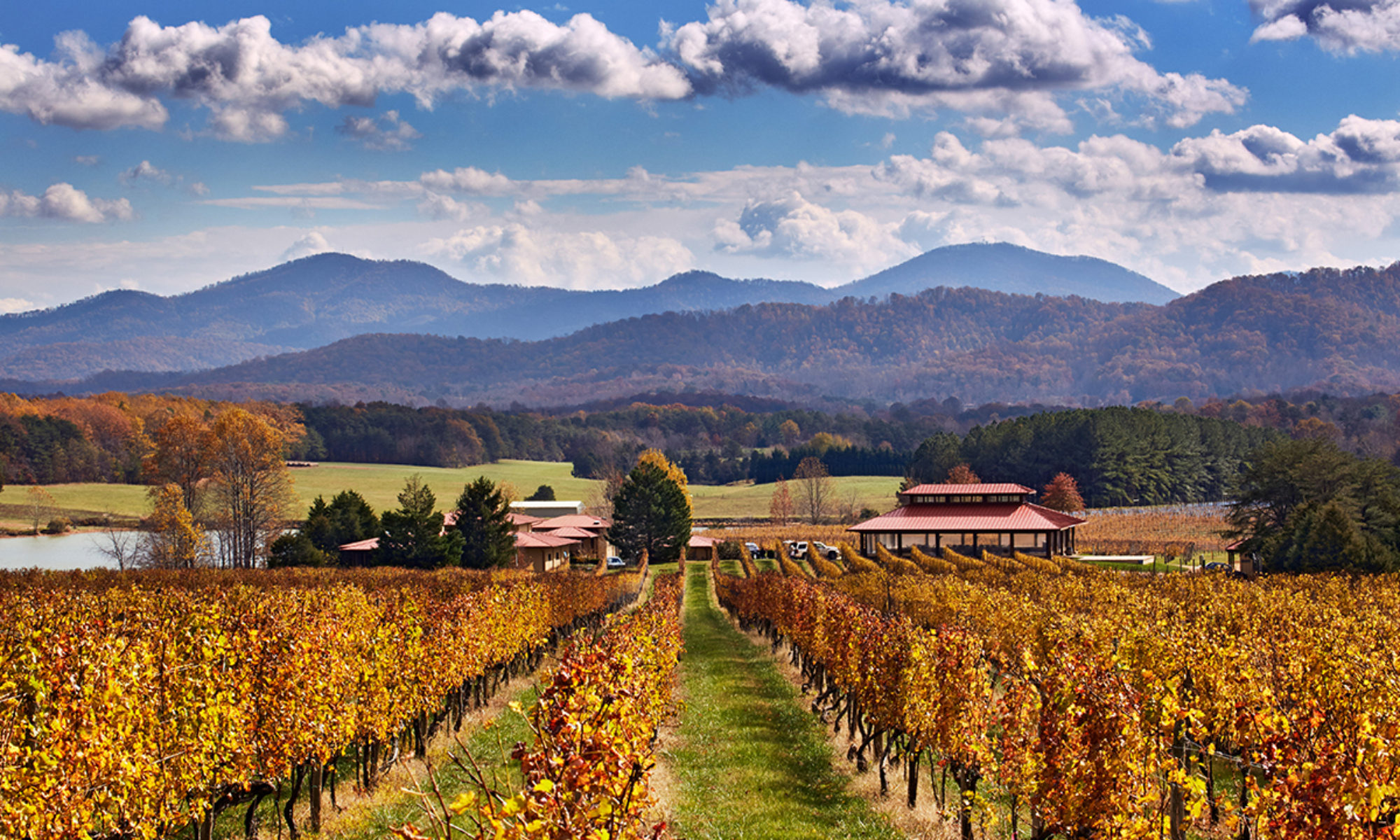Located in Bent Mountain, just south of Roanoke and close to the Blue Ridge Parkway. Owners Russ and Paula Amrhein both grew up in Salem, Virginia, and purchased the site in 1995. They brought an agricultural background and learned about wines from conferences and fellow Virginia winemakers. Wine production started in 1999, putting AmRhein among the oldest 100 of Virginia’s now 300+ wineries. The family name also means “on the Rhine,” appropriate for another great wine growing region, and has guided the winery towards wine with a German influence. The winemaker is Steve Bolleter.
Wine. Tier II. The 2017 vintage AmRhein Melange was awarded a silver medal at the 2022 Virginia Governor’s Cup state-wide wine competition, while the 2019 vintage Cabernet Franc and Petit Verdot were awarded bronze medals. At the 2021 Governor’s Cup competition, the winery’s 2019 Sauvignon Blanc and Pinot Grigio were awarded silver medals, while the 2019 Rose, 2019 Petit Manseng, and 2017 Anglianico (a red varietal from southern Italy) came away with bronze medals. AmRhein prides itself on its 100% estate-grown wine, specializing in wines with a German influence. Grapes are sourced from three vineyards at different elevations: the one on Bent Mountain, and two others in southern Virginia, in Franklin County and Botecourt. Annual production is around 7,000 cases. Red wines include varietals based on Petit Verdot, Merlot, Cabernet Franc and the unusual Aglianico, and a red blend. White wines include Chardonnay, Pinot Grigio, Traminette, and Vidal Blanc. The latter produces an excellent ice wine in years when the weather allows it. Other varietals are planted and may be available depending on the year.
Setting. One star. Good views from both indoors and the winery covered deck of the surrounding hills and vineyards, set in a valley with a pond and wide green lawn. The tasting room is in a red tin building with a gray roof, with French doors. Snacks for a light picnic are available.
Stories. The Great Franklin County Moonshine Conspiracy. Bottom Creek Lane, minutes from AmRhein Wine Cellars in Bent Mountain, had the largest distillery in Roanoke County during Prohibition. Just to the east of Bent Mountain, though, across the Franklin County line, lay bootleggers of an even higher order: the Moonshine Capital of the World.
The Wettest County in the World was published in 2008, written by Matt Bondurant. The historical novel recounts the story of Bondurant’s grandfather and grand-uncles, during the Depression and Prohibition in the rural Blue Ridge Mountains. The title was borrowed from the writing of then-journalist, and later novelist, Sherwood Anderson, who called Virginia’s Franklin County the “wettest county in the world” during Prohibition. Bondurant’s novel was made into a Hollywood movie in 2012, starring Shia LaBeouf and Tom Hardy, “Lawless.”
Prohibition began in 1916 in Virginia, four years ahead of the rest of the country, and lasted seventeen years. Illegal distilleries and bootlegging quickly flourished throughout the country, but perhaps nowhere more so than in southwestern Virginia. The image of a moonshiner in the Blue Ridge Mountains tends to bring to mind an impoverished backwoods farmer, but in reality, some moonshiners would turn an incredible profit, especially during Prohibition. In Virginia’s mountains, a few bootleggers were quite wealthy, earning tens of thousands of dollars in cash while the Great Depression was in full swing. One such moonshiner in Franklin County bought an airplane so that his son could fly over their land and make sure their stills weren’t visible from above. Distillers were professionals at their trade, and experts in counter-surveillance. In 1933, at the end of Prohibition, moonshining had become a huge economic force in the mountains of Virginia, and the profits from illegal moonshining in the region remained high, encouraging the bootleggers to keep at it. In 1935, this would ensnare Franklin County and bring the Blue Ridge to national attention, with the Great Moonshine Conspiracy Trial.
Although Prohibition was no longer in effect, illegal moonshine was still a thriving industry, as moonshiners went to great lengths to avoid paying taxes on their products. Some officials in Franklin County accepted bribes to look the other way and protect bootleggers from other lawmen and moonshine distillers; even the Sheriff of Franklin was in on the racket, overseeing a complex bribery system for the biggest moonshine producers in the region. The trial would pitch Franklin County into chaos, with threats, jury tampering, and the murder of a key witness, along with a uninvolved bystander, happening during the proceedings. Two men connected to the illegal liquor trade in West Virginia would be charged and convicted of the murders, but another witness perished under suspicious medical causes during the trial, casting doubt on whether the trial could possibly end with a successful outcome. The tense trial was the longest in Virginia’s history, and the dramatics of the case consistently kept it on the front page of newspapers around the country. Eventually, 34 people would be indicted in the case, including 19 bootleggers, one corporation, and nine government employees, but convictions and punishments were surprisingly light for the crimes; jail sentences were two years or less, fines were shockingly low. An air of mystery continues to surround the case, as part of the trial records “disappeared” from the Franklin County Courthouse files.
Franklin County hasn’t given up on its past economic success. in the 1970s, a moonshiner bulldozed a massive hole into a field, built an underground room with a sod-covered roof, placed cinder block “headstones” on top, and created a fake cemetery that they regularly mowed and placed flowers throughout. The still was discovered in 1979.
Thanks to Patricia Keppel and her blog for much of this material, at https://blog.virginia.org/2020/05/franklin-moonshine-history/
